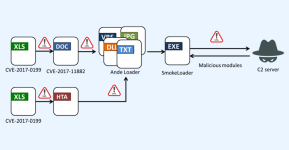The SmokeLoader malware is back, aiming at Taiwan's IT and manufacturing. This cyber threat is known for its lasting presence and growing skills. It's causing worry among security experts and leaders.
Taiwan's strong tech and manufacturing have made it a key target for hackers. The rise in SmokeLoader attacks shows how complex cyber threats are getting.

As we face these cyber threats, it's important to know about SmokeLoader's growth. We must see how it affects Taiwan's tech and the world's tech scene.
Understanding SmokeLoader: A Persistent Cyber Threat Evolution
In the world of cybercrime and cybersecurity threats, SmokeLoader stands out. This malware has been a challenge for years. It keeps changing to avoid being caught and cause trouble for its victims.Historical Background of SmokeLoader Malware
SmokeLoader started in the early 2010s. It quickly became known for its wide range of malware attacks. These included stealing data, gaining remote access, and even industrial espionage.Its design made it easy to update and customize. This made it a top choice for cybercriminals looking for a versatile tool.
Technical Characteristics and Capabilities
SmokeLoader is a strong backdoor Trojan. It lets its operators control infected systems remotely. It can log keystrokes, take screenshots, transfer files, and download more malware.This makes SmokeLoader very useful for cybercrime groups. They use it to target many different industries.
Evolution of Attack Patterns
SmokeLoader has changed its tactics over the years. It used to rely on social engineering. Now, it uses exploit kits and malicious macros.This shows how well it adapts to new security measures. It keeps finding ways to stay relevant in the cybersecurity threats world.
The ongoing evolution of SmokeLoader highlights the need for constant vigilance. We must stay proactive with our cybersecurity to fight this and other malware attacks.
Recent Surge in Taiwan's Manufacturing Sector Attacks
Taiwan's tech industry is facing a big challenge with a rise in cyberattacks. These attacks target the manufacturing sector. They show the need for strong cyber defense strategies to protect the taiwan tech industry.Threat actors are now focusing on Taiwan's manufacturing sites. They use smart tactics to get into important systems and stop production. The SmokeLoader malware is a big problem, hitting many companies across different fields.

Experts say these attacks are because Taiwan is key in global supply chains. As Taiwan keeps making important tech parts, attackers see a chance to cause trouble. They aim to mess with international trade and business.
The effects of these advanced persistent threats (apts) are big. They hurt not just the companies attacked but also the whole economy. Cybersecurity experts and leaders must work together. They need to come up with strong plans to fight these threats and keep Taiwan's tech safe.
Impact on Taiwan's Information Technology Infrastructure
The recent SmokeLoader malware campaign has hit Taiwan's IT hard. It has targeted key systems, causing data breaches and economic losses. These effects have spread through Taiwan's tech sector.Critical Systems Affected
SmokeLoader has attacked many important systems. This includes ERP platforms, industrial control systems, and communication networks. These attacks have made it hard for Taiwanese IT companies to work smoothly.Data Breach Implications
The data breaches from SmokeLoader have exposed sensitive info. This includes customer records, intellectual property, and financial data. This breach has hurt trust in Taiwanese IT companies and their partners.Economic Consequences
The SmokeLoader malware campaign has also had big economic effects. Companies have seen lost productivity, revenue, and market share. The costs of network security measures and incident response have added to the financial strain.Taiwan's IT companies are now facing a big challenge. They need to strengthen their network security measures and incident response plans. This will help protect Taiwan's IT infrastructure from future attacks.

Current Threat Landscape in Taiwanese Industries
The cybersecurity scene in Taiwan's industries, especially in IT and manufacturing, is a big worry. Threat actors are going after these key areas, using advanced malware like SmokeLoader to mess with operations.SmokeLoader's comeback has really caught the attention of Taiwanese industries. This threat has shown it can change and grow, posing a big problem for cybersecurity experts. The focus on Taiwan's IT and manufacturing shows how smart and determined these threats are.
| Threat Actor | Motivation | Targeted Sectors |
|---|---|---|
| State-sponsored Hacking Groups | Geopolitical Interests, Espionage | Information Technology, Critical Infrastructure |
| Cybercriminal Syndicates | Financial Gain, Data Exfiltration | Manufacturing, Supply Chain |
| Hacktivists | Ideological Objectives, Protest | All Sectors |

Taiwan's industries need to stay alert and keep improving their defenses as threats keep changing. Working together between the public and private sectors, and with other countries, is key. This will help keep Taiwan's important infrastructure safe and keep it a leading tech player worldwide.
SmokeLoader Malware Resurfaces, Targeting Taiwanese IT and Manufacturing
The SmokeLoader malware is back, causing worry for Taiwanese manufacturing companies and IT groups. This cyber threat has changed, now attacking key systems and causing trouble in Taiwan's tech world.Attack Vector Analysis
SmokeLoader's new attack uses many ways to get into Taiwanese network security systems. Experts found it uses smart phishing emails, hacked websites, and supply chain weaknesses to get in.Infection Chain Details
After getting in, SmokeLoader starts a complex chain to spread. It uses extra payloads, moves laterally, and finds system weaknesses to stay around.Payload Distribution Methods
SmokeLoader's bad stuff is now spread in many ways, making it hard for Taiwanese groups to keep their network security up. The bad guys keep changing their tricks to avoid old security methods.
With SmokeLoader back, Taiwanese manufacturing companies and IT need to be extra careful. They must use strong defense plans to fight off this ongoing cyber threat.
Detection and Prevention Strategies
SmokeLoader malware is back, targeting Taiwanese IT and manufacturing sectors. Cybersecurity defense and data breach prevention are now more important than ever. Taiwanese industries must be alert and take action to fight this cyber threat.Early detection of SmokeLoader's activity is key in cyber defense. Security teams should watch network traffic, system logs, and endpoint behavior for signs of malware. Using advanced threat-hunting and security analytics can help find and stop infected systems early.
To stop SmokeLoader infections, Taiwanese organizations need strong cybersecurity defense steps. This includes keeping software up to date, using antivirus and anti-malware, and training employees on security. Also, setting up strict access controls, network segmentation, and secure remote access can help prevent data breaches.
Regular backups and having a plan for incidents are vital for Taiwanese industries. Being proactive and following these best practices can strengthen a company's cyber defense. This way, they can reduce the harm caused by SmokeLoader attacks.

Advanced Persistent Threats in Manufacturing Environments
In today's world, manufacturing places are often hit by advanced persistent threats (APTs). These attacks are sneaky and smart. They target the supply chain and industrial control systems (ICS).Supply Chain Vulnerabilities
Modern supply chains are connected, making them easy targets for spear-phishing attacks and malicious payloads. Hackers use these spots to get to important data and mess with key operations. It's key to protect the supply chain to lessen the damage from malware campaigns.Industrial Control System Risks
Industrial control systems are crucial in making things and are now being attacked by APTs. If these systems get hacked, it can let attackers into the whole factory. They can then mess with production and steal secret info. Keeping ICS safe is a big deal for factories.| Vulnerability | Impact | Mitigation Strategy |
|---|---|---|
| Supply Chain Weaknesses | Exploitation of third-party suppliers, introduction of malicious payloads | Implement rigorous vendor vetting, supply chain risk management, and monitoring processes |
| Industrial Control System Vulnerabilities | Disruption of production, data theft, and system compromise | Deploy robust security measures, including ICS-specific security controls and regular vulnerability assessments |
Cybersecurity Best Practices for Affected Sectors
The SmokeLoader malware is back, targeting Taiwan's IT and manufacturing industries. It's vital for these sectors to use strong cybersecurity measures. By taking proactive steps, they can protect their systems and data from threats.Keeping software and systems updated is key. This reduces the chance of malware like SmokeLoader exploiting weaknesses. Regular checks and scans can find and fix vulnerabilities before they're used by attackers.
| Cybersecurity Measure | Impact on Taiwan's Cybersecurity |
|---|---|
| Multifactor Authentication | Strengthens access controls and prevents unauthorized access to critical systems, reducing the risk of data breaches. |
| Employee Cybersecurity Training | Empowers employees to recognize and respond to phishing attempts and other social engineering tactics, mitigating the risk of infection through human-targeted attacks. |
| Network Segmentation | Limits the lateral movement of malware within an organization's network, containing the spread of threats like SmokeLoader and minimizing the overall impact. |
By following these best practices, Taiwanese IT and manufacturing companies can boost their taiwan cybersecurity. They can fight off industrial cybersecurity threats like SmokeLoader. This helps protect their operations from taiwan cybercrime.
Global Implications of Taiwan's Tech Industry Targeting
The SmokeLoader malware has hit Taiwan's tech and manufacturing hard. This has big effects worldwide. Taiwan is key in tech and supply chains, making security breaches a big worry for everyone.International Security Concerns
Taiwan leads in semiconductors and advanced electronics. This makes it a big target for cybersecurity threats like ransomware, phishing scams, and advanced persistent threats. If these sectors get hit, it could mess up data, disrupt key systems, and give enemies an edge in world politics.Market Impact Assessment
The SmokeLoader attacks on Taiwan's tech could shake the global market. It might cause product shortages, price changes, and economic uncertainty. This is especially true for industries that rely a lot on Taiwanese tech and parts.| Impact Area | Potential Consequences |
|---|---|
| Global Technology Supply Chains | Delays, shortages, and price volatility for electronic devices and components |
| International Trade and Commerce | Disruptions in the flow of goods and services, affecting global economic stability |
| Investor Confidence | Increased uncertainty and risk aversion, potentially leading to market fluctuations |
Response Measures and Incident Management
When SmokeLoader malware hit Taiwanese companies in IT and manufacturing, quick action was key. It was vital for these firms to take steps to fight the threat. They needed to stop the malware, get rid of it, and fix the damage from information theft and cybercriminal actions.First, they had to figure out how far the spear-phishing campaign went and what systems were hit. Experts say it's important to have strong plans in place. This includes isolating infected devices, locking down network access, and keeping data backups safe.
| Response Measure | Description |
|---|---|
| Incident Containment | Identify and isolate compromised systems to prevent the further spread of the SmokeLoader malware. |
| Malware Eradication | Thoroughly investigate and eliminate the SmokeLoader infection from affected systems, including removing any malicious files or registry entries. |
| Data Recovery | Restore critical data and systems from secure backups to ensure business continuity and minimize the impact of the attack. |
| Threat Hunting | Proactively search for and detect any additional signs of compromise or lateral movement within the network. |
Future Outlook and Security Recommendations
The cybersecurity world is always changing. The return of SmokeLoader malware in Taiwan's IT and manufacturing shows we need to stay ahead. Experts say threats like APTs and industrial espionage will keep coming. This is because Taiwan's tech industry is so important.To keep Taiwan safe, we need a strong plan. Working together between government, businesses, and cybersecurity experts is key. We must also invest in the latest threat intelligence and response tools.
Teaching employees about cybersecurity is also vital. This can help stop attacks that trick people and insider threats. Keeping security up to date, using strong access controls, and having good backup plans will help protect Taiwan's key systems and data.



